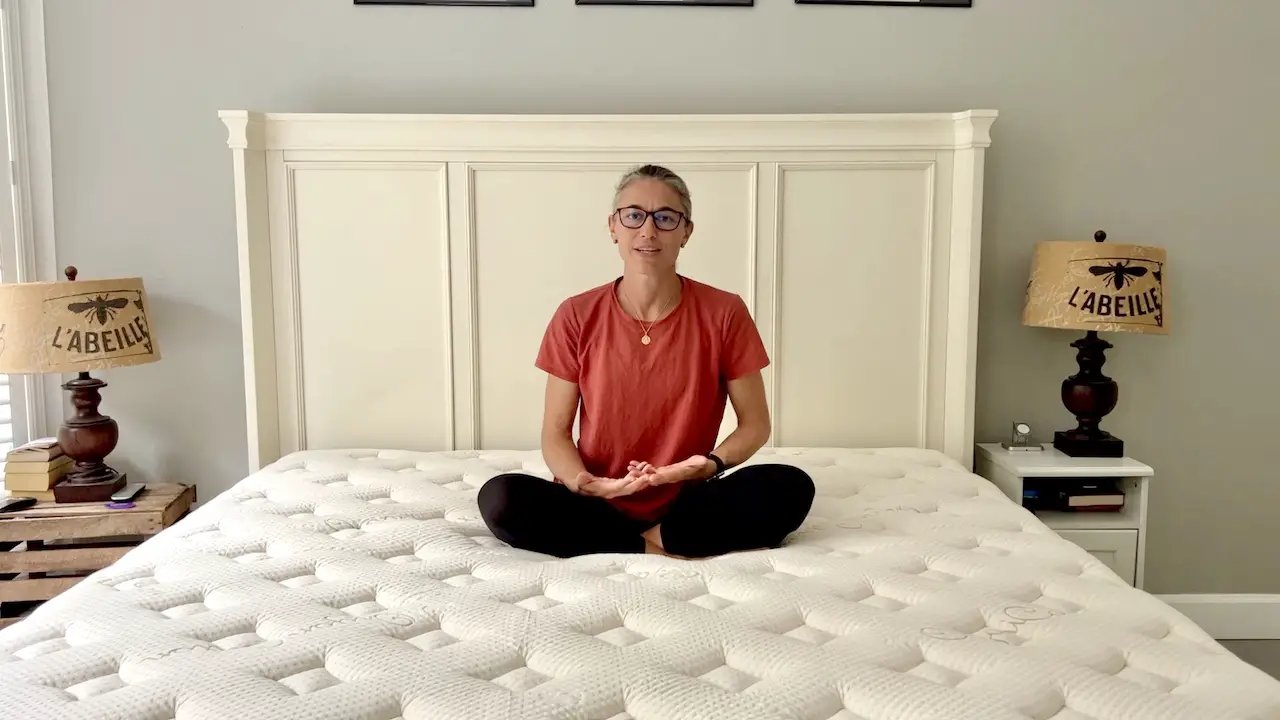SLEEP AND HEART HEALTH
How Rest Impacts Your Cardiovascular System
Getting quality sleep is essential for overall well-being, and its impact on heart health is significant. Poor sleep patterns can increase the risk of heart disease, high blood pressure, and other cardiovascular issues.
Let’s explore the connection between sleep and heart health, how much sleep you need for a healthy heart, and provide tips to improve sleep for better cardiovascular function.
Note that this article does not constitute medical advice. It is written for information only, based on published work and research, and should not be used in lieu of a medical consultation. Consult a medical professional with questions and prior to starting treatment or lifestyle changes.
Table of Contents
The Link Between Sleep and Heart Health
Sleep plays a crucial role in maintaining heart health. During deep sleep, the body undergoes essential processes that regulate blood pressure, reduce inflammation, and allow the heart to rest. Insufficient or poor-quality sleep can lead to an increased risk of heart-related conditions, including:
High blood pressure (hypertension) – Sleep helps regulate blood pressure, and inadequate sleep can contribute to elevated levels. The Mayo Clinic mentions that: “People who sleep six hours or less may have steeper increases in blood pressure.“
Heart disease – Chronic sleep deprivation is linked to a higher risk of coronary artery disease, heart attacks, and strokes. A University of Chicago Medicine study relates that: “Adults with 5 hours of sleep or less have a 200% to 300% higher risk of coronary artery build up in arteries, meaning that sleep deprivation can increase coronary artery disease.”
Obesity – Poor sleep can lead to weight gain, a significant factor in heart disease. The National Library of Medicine noticed a: “6% increase in the probability of obesity in 56 507 US adults […] for self-reported sleep duration of less than 7 h per night.“
Diabetes – Lack of sleep affects insulin sensitivity, increasing the risk of type 2 diabetes, which can impact heart health. The American Diabetes Association states that: “in comparison with 7 h/night, each hour decrease or increase in sleep is associated with a 9–14% increase in risk of type 2 diabetes.“
How Much Sleep Do You Need for a Healthy Heart?
Experts recommend that adults get between 7 to 9 hours of sleep per night for optimal health. However, sleep quality is just as important as sleep duration. Disruptions to sleep, such as frequent waking or sleep apnea, can negatively affect heart health even if total sleep hours appear sufficient.
Signs of Poor Sleep That May Affect Your Heart
Feeling tired despite getting enough hours of sleep
Snoring or gasping for air during sleep (potential sign of sleep apnea – see how an adjustable bed can greatly help if you suffer from sleep apnea)
Waking up frequently throughout the night
Increased stress and irritability due to lack of rest
How Poor Sleep Contributes to Heart Disease
Short sleeping times and poor-quality sleep can lead to the following conditions, which impact your heart health:
Increase Stress Hormones – Sleep deprivation elevates cortisol and other stress hormones, which can contribute to high blood pressure.
Lead to Inflammation – Poor sleep increases inflammation in the body, which plays a role in the development of heart disease.
Affect Blood Sugar Levels – Insufficient sleep impairs glucose metabolism, raising the risk of diabetes and cardiovascular issues.
Impact Heart Rate and Blood Pressure – Healthy sleep helps maintain a steady heart rate and stable blood pressure. Chronic sleep issues can lead to irregular heart rhythms and hypertension.
Tips to Improve Sleep for Better Heart Health
If you are concerned about the relationship between sleep and heart health, making changes to your sleep habits can be beneficial. Here are some effective strategies:
1. Maintain a Consistent Sleep Schedule
Go to bed and wake up at the same time every day, even on weekends. A consistent sleep routine helps regulate your body’s internal clock and promotes heart health.
2. Create a Relaxing Bedtime Routine
Wind down before bed with relaxing activities like reading, meditating, or taking a warm bath. Avoid stimulants such as caffeine and electronic screens at least an hour before bedtime. If you do not have a set bedtime routine, use our 7-to-10PM bedtime routine for adults guide.
3. Invest in a Comfortable Mattress and Bedding
Do you wake up often, or find yourself tossing and turning at night, waking with pains or fatigue? A high-quality mattress and breathable bedding can improve sleep quality by reducing discomfort and temperature fluctuations.
4. Manage Stress and Anxiety
Stress is a major contributor to poor sleep and heart health issues. Practice mindfulness, deep breathing, or yoga to reduce stress before bed.
5. Exercise Regularly
Physical activity promotes better sleep and strengthens heart health. However, avoid intense workouts too close to bedtime, as they may disrupt sleep. Use this guide to understand how long before you should exercise.
6. Avoid Late-Night Eating and Alcohol
Eating heavy meals or consuming alcohol late at night can interfere with sleep quality. Aim to finish meals at least two hours before bed.
7. Address Sleep Disorders
If you experience persistent sleep problems, consult a healthcare provider to rule out conditions such as sleep apnea, which is closely linked to heart disease.
Final Thoughts on Sleep and Heart Health
Sleep and heart health are deeply connected. Prioritizing good sleep habits can reduce the risk of heart disease, regulate blood pressure, and improve overall cardiovascular function. By making simple lifestyle changes, such as maintaining a consistent sleep schedule, reducing stress, and investing in a comfortable sleep environment, you can support both better sleep and a healthier heart.
For more tips on improving sleep quality and finding the best bedding for restful nights, explore our expert mattress and sleep product reviews.
References
- Mayo Clinic. (2024). Sleep deprivation: A cause of high blood pressure? Retrieved from https://www.mayoclinic.org/diseases-conditions/high-blood-pressure/expert-answers/sleep-deprivation/faq-20057959
- Diabetes Journal. (2024). Waking Up to the Importance of Sleep in Type 2 Diabetes Management: A Narrative Review. Retrieved from https://diabetesjournals.org/care/article/47/3/331/154247/Waking-Up-to-the-Importance-of-Sleep-in-Type-2
- National Library of Medicine. (2013).
Sleep and obesity. Retrieved from https://pmc.ncbi.nlm.nih.gov/articles/PMC3632337/ - UChicago Medicine. (2024). Sleep Prevention and Heart Disease: Everything You Need to Know. Retrieved from https://www.uchicagomedicine.org/forefront/heart-and-vascular-articles/how-sleep-deprivation-and-sleep-apnea-impact-heart-health
FAQ
Most frequent questions and answers
Sleep helps regulate blood pressure, reduce inflammation, and support heart function. Poor sleep increases the risk of heart disease, high blood pressure, and obesity.
Experts recommend 7 to 9 hours of quality sleep per night for optimal heart health and overall well-being.
Yes, chronic sleep deprivation can lead to high blood pressure, irregular heart rhythms, and increased inflammation, all of which contribute to heart disease.
Signs include frequent waking, snoring, excessive daytime fatigue, high stress levels, and difficulty staying asleep throughout the night.
Maintain a consistent sleep schedule, reduce stress, invest in a quality mattress, avoid late-night eating, and seek treatment for sleep disorders like sleep apnea.
What is the connection between sleep and heart health?
Sleep helps regulate blood pressure, reduce inflammation, and support heart function. Poor sleep increases the risk of heart disease, high blood pressure, and obesity.
How many hours of sleep do you need for a healthy heart?
Experts recommend 7 to 9 hours of quality sleep per night for optimal heart health and overall well-being.
Can lack of sleep cause heart disease?
Yes, chronic sleep deprivation can lead to high blood pressure, irregular heart rhythms, and increased inflammation, all of which contribute to heart disease.
What are the signs of poor sleep affecting heart health?
Signs include frequent waking, snoring, excessive daytime fatigue, high stress levels, and difficulty staying asleep throughout the night.
How can I improve my sleep for better heart health?
Maintain a consistent sleep schedule, reduce stress, invest in a quality mattress, avoid late-night eating, and seek treatment for sleep disorders like sleep apnea.
Share this deal with a friend!

Laura Georgieff
Laura is a mother of three who did not sleep through the night for the first 5.5 years of her kids' lives. She is passionate about sleep quality and loves sharing her experience and knowledge of all thing bedding! It is her mission to help you make the best decisions when it comes to sleep and help you get the best deal on the market!






